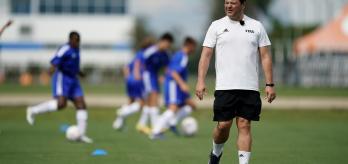The FAI’s Education and Development Strategy 2025-30 is an exciting, new initiative which places learning at its core. Central to the strategy is the aim of placing players, coaches, administrators, referees and all other stakeholders at the heart of a synergised learning system to maximise the potential of Irish football.
Learning
- The importance of bringing football education into the classroom.
- Understanding the FAI’s vision of, "Where there is football, there is education, and where there is education, there is football".
- Why the FAI are moving away from a competency-based approach to continuous professional development (CPD) towards an expertise approach.
Supporting every individual within the ‘ecosystem of coach development’ is one of the primary goals of the Education and Development Strategy. O’Regan highlights that, in the past, grassroots or volunteer coaches might have received just one day of formal training and education. However, moving forward, the FAI aims to expand the support available by offering greater resources, such as accessible e-learning guides for coaches that include best-practice, age-appropriate training. “We’re going to look at a more centralised approach. So, what are their needs, in their context, in their environment? How do we provide blended learning – not only in person, from a practical and theoretical sense, but also e-learning?” said O’Regan.
Ultimately, O’Regan claims that the long-term goal of the Education and Development Strategy is to produce better players, coaches, and referees, and to ensure that all stakeholders in the game have better access to education through football, bringing to life the strategy’s vision that, “Where there is football, there is education, and where there is education, there is football”.
Education Development
Bringing the medium of football to the classroom is another component of the FAI’s Education and Development Strategy. This will link football education with formal education for primary, post-primary and third-level students. O’Regan notes that the FAI will implement training for teachers through courses and other resources that will allow them to bring the world into the classroom.
One way of achieving this is through ‘movement breaks’. “Movement breaks are how primary school teachers segue from one subject to another”, explains O’Regan. At primary school level, children are provided with a short period of physical activity at regular intervals to allow them to re-energise.
“We have developed 50 movement breaks that teachers can utilise in the classroom. An example would be looking at a great Irish goal that was scored with a header and getting a paper football, positioning it on the ceiling, and seeing if the kids can replicate the height that the player got to while scoring. Then, you’d capture that on video and use an analysis tool to bring maths into the environment”.
Furthermore, as O’Regan highlights, by incorporating football into formal education, children will become aware that there are more roles and opportunities in the sport than just being a player, allowing them to engage in a completely different way with the beautiful game.
Referee Development
One of the main prongs of the Education and Development Strategy is to enhance the development of referees in Ireland. O’Regan says that this ‘targeted approach’ will have several benefits for Irish football:
- There will be a stronger focus on boosting the number of female referees within the FAI’s ecosystem;
- It will improve the retention rate of referees in the game;
- It will develop the current crop of officials in the country.
Additionally, he states that the strategy includes introducing the role of a referee facilitator.
“[This] is a softer entry point for young people who may want to become a referee in the future. The facilitator role will focus on U7 to U12 games programmes where they will get the opportunity to facilitate the environment, more like an on-field coach rather than a referee.” O’Regan explains that the ‘facilitator’ will wear armbands or jerseys that signify they are under 18 to encourage parents and volunteers to be less emotive towards the referee and the players, creating a safer environment for everyone involved.
The strategy also includes a mandatory e-learning respect module from U13 level, which must be completed by all stakeholders, to ensure that everyone is aware of the rules and the importance of respect, inclusivity, and managing emotions.
O’Regan adds that, from 2026 onwards, coaches will be able to complete referee qualifications to gain a real insight into the role of match officials, while also operating as a referee as part of their coaching assignments. Coaches will also be able to have mentorships with experienced referees to establish mutual respect and a relationship between the two different roles.
Coach Development
“Our new approach within coach development is to place the learner at the centre of the learning experience”, says O’Regan. With the new Education and Development Strategy, the FAI will implement further resources to build expertise, including:
- an FAI playbook;
- a new app;
- a refurbished website;
- more age- and stage-appropriate courses.
“There’s going to be a lot more regionalised and centralised workshops in clubs at each of the respective Club Mark levels, providing coaches on the ground, in the grassroots game, with real-life experiences in their context [and] in their environment,” states O’Regan. “So, somebody coming in that is actively just going to work in the adult amateur game will be able to go into that environment as their first step because we want it to be real to the context and experience that they have.”
With the FAI’s Education and Development Strategy, O’Regan explains that there will also be a shift towards an expertise approach to continuous professional development (CPD) instead of a competency-based approach. The latter focuses on giving coaches skills and tools to perform tasks effectively, while an expertise approach centres on gaining deep knowledge and mastery in a specific field. More information on this topic can be found by clicking this link. O’Regan believes the previous approach to CPD meant that coaches lacked support and the opportunity to undertake e-learning or go to coaching conferences.
“In our new approach, we’re going to set up individualised, tailor-made development plans, working with each of the coaches to provide them with the opportunity to maximise their potential,” he concluded.
Summary
- The Education and Development Strategy 2025–30 places learning at the heart of Irish football, creating a centralised department to support all stakeholders.
- Football is being integrated into the formal education system in Ireland, highlighting wider opportunities in the sport beyond playing.
- Referee development targets more female officials, youth facilitators, and stronger coach-referee relationships through education.
Reflection
- How can your country centralise education for all stakeholders to improve player, coach and referee development?
- How can placing the learner at the heart of development foster a greater learning experience for the key stakeholders in your line of work?
- In what ways can blended learning tools be tailored to better serve the unique needs of grassroots coaches and volunteers in your country?









